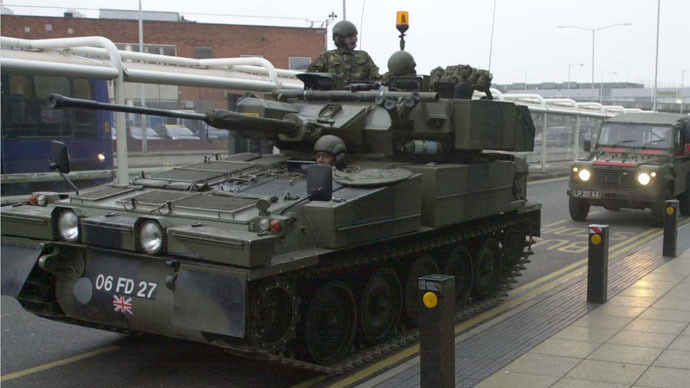Anti-arms trade activists defend proposed military cuts

UK NGO Campaign Against the Arms Trade (CAAT) has blasted suggestions that a scaling down of the government’s substantial military equipment program would harm jobs and national security.
The Financial Times reported on Tuesday that defense industry bosses were concerned about their future in light of dwindling defense budgets.
CAAT media officer Andrew Smith told RT UK: “At £37 billion the UK has the sixth-highest military budget in the world. That is before you take into account the extra money that has been found to fight foreign wars.”
He said comments like these were part of “a major lobbying exercise being undertaken by arms companies and politicians at the moment to maintain the military budget.
“Only last month we saw arms company representatives dining with over 40 MPs at the ADS Dinner in London. The ADS is the trade body that represents arms company interests.”
Responding to the suggestion that jobs could be at risk, Smith said “There has been a long-term decline in arms industry jobs and we are calling for the government to put the same effort into promoting renewable energy, which we believe can create more and better jobs.”
He urged a fresh approach.
“Regardless of who wins the election, what is needed is not five more years of the same. Rather, it is a broader approach to national security that isn't constantly fixated on militarism and catastrophic military interventions that make us all less safe.”
On Monday US army Chief of Staff General Raymond Odierno aired his concerns over Britain's level of military spending as a percentage of GDP, despite Britain maintaining one of the largest defense budgets in the world after the US, China, Saudi Arabia and Russia.
READ MORE: ‘Very concerned’: Top US general attacks UK military spending cuts
In December last year, the Ministry of Defence (MoD) came under sustained criticism when it revealed in its annual report it had wasted £5.7 billion worth of public money, with large amounts going on obsolete or faulty equipment.
Some £1.5 million was spent on faulty software and £7.2 million was squandered on a range of mobile mine detection capability for Warrior armored vehicles, which were later found to be “unsuitable.”
The report also revealed that an RAF HS125 aircraft worth £488,000 was removed from service early after it sustained damage during a hailstorm.
The UK defense industry is estimated to employ 160,000 people and bring in £22 billion per year to the British economy.












